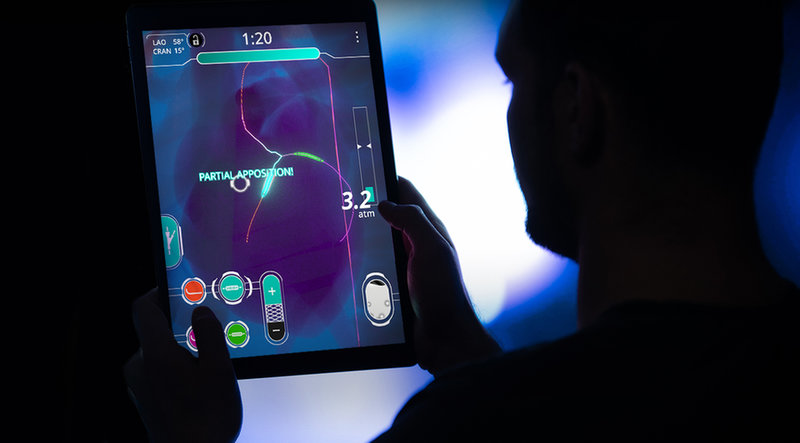Innovation
Ready player one: the marriage of video games and medical technology
From occupational therapy to clinician training, gaming is becoming an increasingly popular way to help make medical procedures and information more fun and engaging. Chloe Kent takes a closer look into these projects to find out how video games are being used in medical settings.
L
azy eye, also known as amblyopia, is a condition which affects about 3% of the world’s population. It occurs when the brain begins to favour the use of one eye over the other, and so begins to ignore its signals. Amblyotech, a US-based start-up developing a novel treatment for the condition, has now been acquired by Swiss pharma giant Novartis. Taking things a step further than corrective glasses, Amblyotech aims to treat lazy eye through a video game.
With 3D glasses and a tablet, Amblyotech’s Dig Rush app delivers different images to each eye through different gameplay elements, such as cartoon mole characters which mine and collect different objects. The game forces both eyes to work together to improve the patient’s binocular vision.
Early clinical studies have demonstrated improvements in vison for both children and adults with a lazy eye, with faster onset compared to standard treatments like wearing an eye patch. Now it has acquired Amblyotech, Novartis will continue working in partnership with Ubisoft to develop the software and create a series of engaging games for the Dig Rush app, with a proof of concept trial planned for later in the year.
This project is just one of many in the digital health arena that is focused on gamification of medicine. Formerly the domain of small start-ups, bigger players in the industry are starting to pay attention to the potential of video games in digital health.

Akili’s lead product is the EndeavorRx treatment. Credit: Akili
A video game that improves cognitive function
Amblyopia is far from the only condition for which therapies are being gamified. Akili Interactive is developing a range of prescription video games designed to combine specialised algorithms with gaming technology to improve cognitive function in patients with neurological disorders.
Akili’s lead product is the EndeavorRx treatment, a tablet-based game designed to improve brain function in the prefrontal cortex by having the user multi-task increasingly complex activities. It is designed to improve attention function in children aged 8 to twelve who have attention deficit hyperactive disorder (ADHD).
EndeavorRX was cleared by the US Food and Drug Administration (FDA) in June 2020 as a prescription treatment for children with ADHD, based on data from five clinical studies in more than 600 children with the condition. This included a randomised controlled study published in The Lancet Digital Health, which showed EndeavorRx improved objective measures of attention in these patients.
“The technology behind EndeavorRx presents specific sensory stimuli and simultaneous motor challenges.”
After four weeks of EndeavorRX treatment, a third of the participants no longer had a measurable attention deficit on at least one objective measure of attention. About half of the participants’ parents also saw a clinically meaningful change in their child’s day-to-day ADHD symptoms after a month of treatment, which increased to 68% after two months.
Akili Interactive CEO Dr Eddie Martucci says: “The technology behind EndeavorRx presents specific sensory stimuli and simultaneous motor challenges designed to target and activate the neural systems that play a key role in attention function, while using adaptive algorithms to personalise the treatment experience for each individual patient. This enables second by second monitoring of patient progress completing the treatment sessions, and continuously challenges each patient to an optimised level, encouraging them to improve their performance.
“So, while it looks and feels like a video game, it’s engineered with patented technology to directly access the neurological systems responsible for certain cognitive functions to improve cognitive function.”
As well as ADHD, Akili is assessing further iterations of the product for different cognitive issues: AKL-T02 is being looked into as a potential treatment for attention-related symptoms for children on the autism spectrum; AKL-T03 is being investigated as a treatment for executive function issues in major depressive disorder and cognitive impairments in patients with multiple sclerosis (MS); and AKL-T04 is being assessed to treat executive function alongside emotional processing and mood issues in depressed patients.
Making training more engaging
Alongside practical therapies, clinical training has also been given the video game treatment. Level Ex creates video games for doctors that are designed to bridge the gap between training and entertainment. Cardio Ex, Gastro Ex, Pulm Ex and Airway Ex all simulate a range of medical cases in their respective areas, designed to help clinicians practice their craft. Recently, the company has issued free updates to Pulm Ex and Airway Ex that simulate Covid-19 patient scenarios, and its working on a Covid-19 update for Cardio Ex too.
The company’s team is made up of software engineers and medical expects, who consult with practicing physicians to develop the games, as well as drawing from clinical guidelines to build different scenarios. The game levels provide immediate feedback on whether the decisions made by the clinician playing the game are in line with recommended clinical care. They also have impressive graphics for games designed to run on a smartphone, signalling a marked improvement from the more dated, cartoonish aesthetic of other surgical simulators.
Level Ex vice-president and medical director Eric Gantwerker says: “Our company is really thriving on the idea that gaming psychology and gaming technology can advance the way that information is presented to clinicians and healthcare providers.”
“The entire industry is built on this idea of having you opt in, having you engaged, having you enjoying the experience.”
Turning something, which would usually be boring or otherwise unenjoyable, into a video game essentially makes the process more engaging. Whether it’s a clinician in training or a child with ADHD developing their attentive skills, the more appealing information is to consume the more likely it is to stick in the mind.
“There’s all these deep psychology terms like compulsion loops and flow states about how games have a really nice way of engaging users into the experience. If a game is too boring or too challenging or not fun you won’t play it,” says Gantwerker. “The entire industry is built on this idea of having you opt in, having you engaged, having you enjoying the experience and having you very focused and driven to continue on. That is where we bring in the healthcare experience with the game psychology, to drive these experiences where you can interact with and have more active through processes about information, so you have a deeper understanding. It drives through interest and curiosity.”
Regulatory approval is a little different for companies like Level-Ex, which provide medical training, compared to Akili, which provides a treatment. While Level Ex boasts a rigorous internal process used to develop its products, going through third-party review to assure their accuracy and quality, the games are ultimately information resources for professionals rather than patient-facing applications.

Physicians can download Cardio Ex for free from the App Store and play rare and complex cases anywhere at any time from their mobile devices. Credit: Business Wire
The future of medical video games
Historically, the popular narrative surrounding video games has been that excessive screen time can have a negative impact on cognitive function. However, academic research has found significant cognitive benefits from playing video games, and as the mainstream perspective on gaming has softened, the medical industry at large has taken a greater interest in medical-centric video games.
Akili’s most recent funding round in 2018 reached $68m, and Martucci says the company’s goal is now to grow into a leading provider of digital medicine. At last year’s CES Digital Health Summit, he informed a panel audience that the company would be bucking the medtech trend of leaning on business relationships and sales channels of a more established industry partner to roll out its product, but instead aim to build its own distribution platform.
“We’re really doing as much as we can to provide for healthcare professionals around the world.”
Meanwhile, Level Ex games are played by 600,000 healthcare professionals across the industry, and the company has a respectable working relationship with Johnson & Johnson. The Covid-19 updates for Pulm Ex and Airway Ex were developed using a Johnson & Johnson Institute educational grant.
Time spent playing Level Ex games can also contribute to the US National Institutes of Health’s Continuing Medical Education (CME) credit scheme. CME credits are earned through completing educational activities which help maintain or develop a practitioner’s skills. In some US states a specified number of CME credits is required annually for clinicians to maintain their medical licenses, and most hospitals require a specified number of credits for their physicians to continue practising, regardless of state. Far from being a trivial distraction, playing video games can now contribute to keeping a doctor in their job.
Gantwerker says: “We’re really doing as much as we can to provide for healthcare professionals around the world. We’re trying our best and hard at work to create that content.”